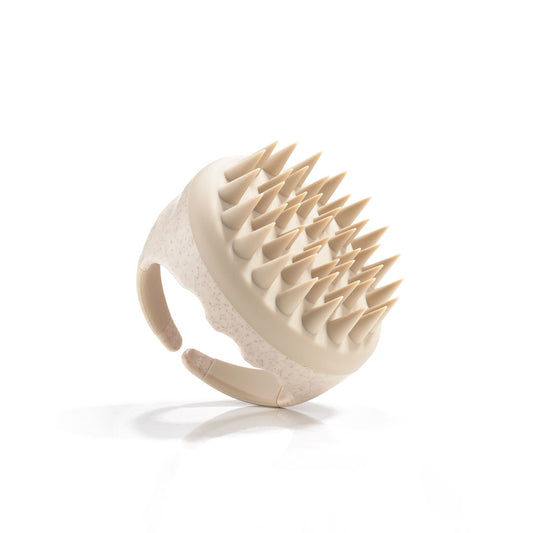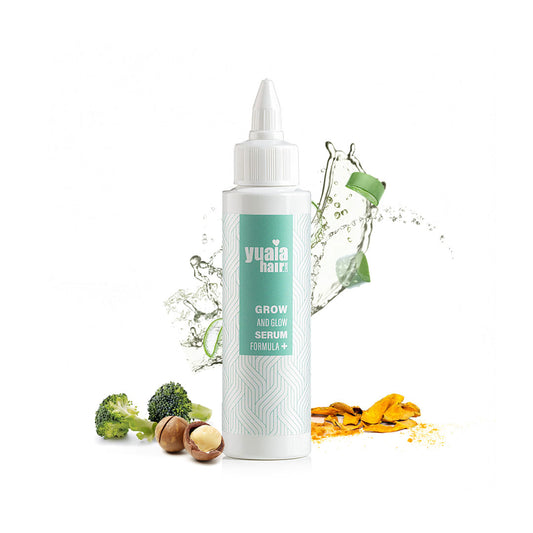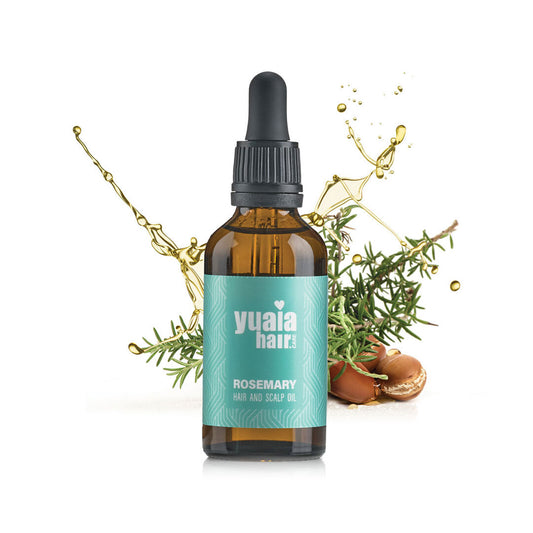
De hoofdhuid effectief hydrateren
Hoofdhuid masseren
Regelmatig je hoofdhuid masseren is een effectieve manier om de bloedsomloop te stimuleren, waardoor essentiële voedingsstoffen naar de haarzakjes worden getransporteerd en de natuurlijke olieproductie wordt ondersteund. Dit kan droogheid voorkomen en de hydratatie verbeteren zonder dat er extra producten nodig zijn. Gebruik je vingertoppen of een hoofdhuidmasseur en oefen dagelijks ongeveer vijf minuten zachte druk uit met ronddraaiende bewegingen. Voor extra voordelen kun je een lichtgewicht, hydraterend serum of olie gebruiken om het vocht beter vast te houden. Hoofdhuidmassage verbetert niet alleen de hydratatie, maar helpt ook spanning te verminderen en ontspanning te bevorderen. Na verloop van tijd kan een consequente hoofdhuidmassage bijdragen aan een gezondere haargroei en een goed gehydrateerde hoofdhuid.
Leave-in conditioners
Leave-in conditioners zijn een uitstekende manier om vocht aan de hoofdhuid toe te voegen en tegelijkertijd het haar luchtig en fris te houden. In tegenstelling tot traditionele conditioners die worden uitgespoeld, zorgen leave-in behandelingen voor een continue hydratatie gedurende de hele dag. Door te kiezen voor een lichtgewicht formule op waterbasis zorg je ervoor dat het vocht de hoofdhuid bereikt zonder dat het teveel opbouwt of het haar vet wordt.
Deze producten zijn vooral nuttig voor mensen met fijn of dun haar, omdat zwaardere formules het haar kunnen verzwaren en tot een vettig uiterlijk kunnen leiden. Veel leave-in conditioners bevatten ook heilzame ingrediënten zoals aloë vera, glycerine en panthenol, die het vocht vasthouden en de hoofdhuid kalmeren.
Voor het beste resultaat breng je een kleine hoeveelheid direct aan op vochtig haar, met de nadruk op de hoofdhuid als hydratatie nodig is. Een leave-in conditioner op spraybasis kan gelijkmatig worden aangebracht zonder de wortels te overbelasten. Regelmatig gebruik van leave-in conditioners helpt het vochtgehalte in balans te houden en bevordert een gezondere en comfortabelere hoofdhuid.
Hoofdhuid serums
Hydraterende hoofdhuidserums zijn een effectieve manier om de hoofdhuid te hydrateren zonder overtollige olie toe te voegen. Deze lichtgewicht formules zijn ontworpen om gerichte hydratatie te leveren en tegelijkertijd problemen zoals irritatie, schilfering of gevoeligheid aan te pakken. Veel serums bevatten ingrediënten zoals hyaluronzuur, niacinamide of aloë vera, die helpen vocht vast te houden en de algehele gezondheid van de hoofdhuid te ondersteunen.
Breng een paar druppels rechtstreeks op de hoofdhuid aan en masseer het zachtjes in om de absorptie te verbeteren. In tegenstelling tot zwaardere oliën worden hoofdhuidserums snel opgenomen zonder een vettig laagje achter te laten, waardoor ze ideaal zijn voor dagelijks of regelmatig gebruik. Een consequente toepassing kan de hydratatie van de hoofdhuid verbeteren en zo een evenwichtige omgeving creëren voor een gezondere haargroei.
Scrub
Regelmatig scrubben van de hoofdhuid helpt om een schoon en gebalanceerd milieu te behouden door dode huidcellen, overtollige olie en productophopingen te verwijderen. Dit proces verhoogt de effectiviteit van vochtinbrengende behandelingen, zodat ze dieper kunnen doordringen. Een scrub van de hoofdhuid of een borstel met zachte haren eenmaal per week kan de bloedsomloop verbeteren, wat een gezondere haargroei bevordert.
Ga op zoek naar scrubproducten met ingrediënten zoals salicylzuur of fruitenzymen, die helpen bij het oplossen van opbouw zonder hard te zijn voor de hoofdhuid. Masseer het scrubmiddel met ronddraaiende bewegingen in en spoel het daarna grondig uit. Regelmatig scrubben voorkomt verstopte follikels en zorgt voor een verfriste, goed gehydrateerde hoofdhuid.
Hydratatie van binnenuit
Voldoende water drinken is essentieel voor een gezonde huid, ook voor de hoofdhuid. Uitdroging kan leiden tot droogheid en irritatie, waardoor de hoofdhuid moeilijker vocht kan vasthouden. Als je de hele dag door voldoende water drinkt, krijg je een gezonde, gehydrateerde hoofdhuid.
Veelgemaakte fouten bij het hydrateren van de hoofdhuid
Een goede hydratatie van de hoofdhuid is essentieel voor gezond haar, maar bepaalde fouten kunnen leiden tot ophoping, irritatie of droogheid. Als je te veel zware oliën gebruikt, kunnen de follikels verstopt raken en als je producten niet goed uitspoelt, kunnen er zich residuen ophopen. Het overslaan van regelmatige hoofdhuidverzorging kan ook de vochtbalans verstoren, waardoor consistent onderhoud essentieel is voor een gezonde hoofdhuid.
Overmatig gebruik van zware oliën of producten
Hoewel oliën goed kunnen zijn voor de hydratatie van de hoofdhuid, kan het rechtstreeks aanbrengen van dikke of zware producten op de hoofdhuid leiden tot ophoping, verstopte follikels en zelfs irritatie. Oliën zoals kokosolie en ricinusolie zijn weliswaar voedend, maar dicht en kunnen een laag vormen die de hoofdhuid belemmert om goed te ademen. Dit kan na verloop van tijd leiden tot jeuk, schilfers of zelfs vettigheid. Kies in plaats daarvan voor lichte, niet-comedogene oliën zoals jojoba- of arganolie, die sterk lijken op de natuurlijke talg van de hoofdhuid. Deze geven vocht zonder de follikels te verstoppen of het haar te verzwaren. Matiging is de sleutel - breng slechts een paar druppels aan en verdeel gelijkmatig.
Verwaarlozen van grondig uitspoelen
Als je haarproducten niet goed uitspoelt, kan er zich residu ophopen, wat kan leiden tot irritatie, jeuk en droogheid. Dit komt vooral voor bij conditioners en stylingproducten. Zorg er altijd voor dat je grondig uitspoelt met lauw water, want te heet water kan het vocht uit de hoofdhuid verwijderen. Eens per maand een zuiverende shampoo gebruiken kan helpen om overtollige opbouw te verwijderen.
Regelmatige hoofdhuidverzorging overslaan
Een goed gehydrateerde hoofdhuid vereist constante verzorging en als je belangrijke stappen overslaat, kan dat leiden tot droogheid, schilfers en irritatie. Veel mensen richten zich op haarverzorging en vergeten de hoofdhuid, maar een gezonde hoofdhuid is essentieel voor sterk, levendig haar. Als je de hoofdhuid niet regelmatig reinigt, kan dit leiden tot productophoping, waardoor de haarzakjes verstopt raken en de natuurlijke olieproductie wordt verstoord.
Exfoliëren is een andere cruciale stap die vaak wordt genegeerd. Als je dit niet doet, hopen dode huidcellen zich op, waardoor hydraterende behandelingen minder goed kunnen doordringen. Eén keer per week een zachte scrub of massage gebruiken kan de doorbloeding verbeteren en de hydratatie verhogen.
Hoofdhuidmassages zijn ook nuttig, omdat ze de natuurlijke olieproductie stimuleren en de doorbloeding verbeteren, wat de algehele gezondheid van de hoofdhuid bevordert. Het gebruik van lichte vochtinbrengende behandelingen of hydraterende serums zorgt ervoor dat de hoofdhuid in balans blijft zonder dat deze te vet wordt. Door een eenvoudige, consistente hoofdhuidverzorgingsroutine toe te passen, creëer je de ideale omgeving voor een gezonde haargroei.
Je hoofdhuid verzorgen voor levendig haar
Sterk en levendig haar begint met een goed gehydrateerde hoofdhuid. Een goede hydratatie ondersteunt een gezonde haargroei en voorkomt veelvoorkomende problemen met de hoofdhuid zoals irritatie of ophoping. Door de juiste producten te kiezen, effectieve hydratatietechnieken toe te passen en een consistente routine aan te houden, creëer je de ideale basis voor een gezonde hoofdhuid. Een uitgebalanceerde aanpak is belangrijk - te veel vocht kan leiden tot vettigheid, terwijl te weinig vocht droogheid kan veroorzaken. Regelmatige hoofdhuidverzorging is goed voor iedereen, ongeacht het haartype. Door te experimenteren met verschillende methoden, zoals serums, massages of leave-in behandelingen, kun je de beste aanpak vinden voor jouw individuele hoofdhuidbehoeften.
Veelgestelde vragen
Hoe vaak moet ik mijn hoofdhuid hydrateren?
De meeste mensen hebben baat bij 2-3 keer per week hun hoofdhuid hydrateren, maar de ideale frequentie hangt af van uw hoofdhuidtype, haartextuur en omgevingsfactoren. Als je een droge of schilferige hoofdhuid hebt, moet je deze mogelijk vaker hydrateren. Luister naar de behoeften van je hoofdhuid en pas je routine daarop aan.
Kan ik gewone haarconditioner gebruiken om mijn hoofdhuid te hydrateren?
Hoewel gewone conditioners enige hydratatie kunnen bieden, zijn ze doorgaans bedoeld voor het haar en niet voor de hoofdhuid. Kies voor gerichte hydratatie van de hoofdhuid voor leave-in conditioners of hoofdhuidserums die speciaal zijn ontwikkeld voor de gezondheid van de hoofdhuid, om ophoping en irritatie te voorkomen.
Op welke ingrediënten moet ik letten in producten voor het hydrateren van de hoofdhuid?
Zoek naar lichte, hydraterende ingrediënten zoals hyaluronzuur, aloë vera, glycerine, panthenol en niacinamide. Deze ingrediënten helpen vocht vast te houden en de hoofdhuid te kalmeren zonder ophoping of vettigheid te veroorzaken.
Is het mogelijk om de hoofdhuid te veel te hydrateren?
Ja, overmatige hydratatie kan leiden tot vet haar, verstopte haarzakjes en zelfs irritatie. Gebruik lichte producten en vermijd het aanbrengen van zware oliën rechtstreeks op de hoofdhuid. Matigheid en consistentie zijn essentieel voor het behoud van een gezonde vochtbalans.
Helpen hoofdhuidmassages echt bij hydratatie?
Ja, hoofdhuidmassages stimuleren de doorbloeding en de natuurlijke olieproductie, wat kan helpen om vocht gelijkmatiger over de hoofdhuid te verdelen. Door regelmatig hoofdhuidmassages in uw routine op te nemen, kunt u de hydratatie verbeteren en de algehele gezondheid van de hoofdhuid ondersteunen.
 2-4 dagen levering
2-4 dagen levering
 100.000+ tevreden klanten
100.000+ tevreden klanten
 Tevredenheidsgarantie
Tevredenheidsgarantie




























